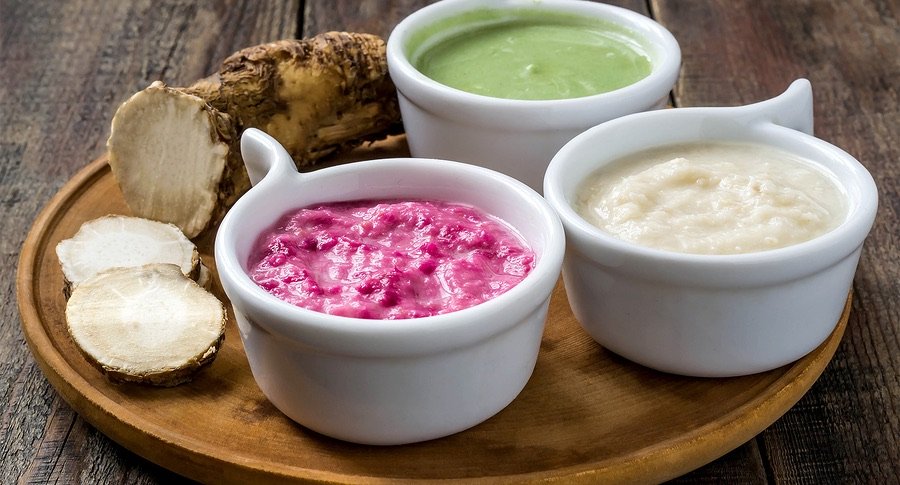As we move into July, you may be focusing on Independence Day celebrations, summer vacation plans, or hitting the beach. But this month has another special significance that you may not be aware of: July is designated as Horseradish Month. For those who love the spicy flavor of horseradish, this should be reason to rejoice. And even if you don’t typically eat much horseradish, you should take this opportunity to give it a try because its health benefits are plentiful.
A member of the Brassicaceae family, horseradish is closely related to mustard, Brussels sprouts, broccoli, wasabi, and cabbage. It’s a root plant that originated in Europe and Western Asia, but it readily grows around the world these days. You can buy fresh horseradish root at most vegetable markets, Asian groceries, and even many supermarkets. Another alternative is to grow your own, as it is a relatively easy plant to cultivate in a sunny or partially shady spot.
To use horseradish, simply cut the root and grate it. It offers a strong flavor, so you may want to go easy on the amount you add to a dish until you are used to the taste. Horseradish can be a wonderful accompaniment to sandwiches, eggs, potatoes, and sushi. In addition, you can use it to spice up salad dressing and hummus. But don’t grate your horseradish until shortly before you will be using it since it starts losing flavor very rapidly.
And now that you’ve (hopefully) decided to start incorporating this vegetable into your cooking, check out the following five reasons why horseradish should become your new go-to condiment.
Horseradish is Rich in Nutrients
This root vegetable is a great source of vitamin C, folate, potassium, calcium, manganese, zinc, and magnesium. It is also high in fiber, with 2 grams in a quarter-cup serving. Its fiber content means even a little horseradish can help fill you up, and it aids the digestive process. In addition, horseradish contains glucosinolates such as sinigrin, which is the chemical that gives it that strong scent and is associated with a number of health benefits including lowering the risk of liver cancer.1 Jie, Meng; et al. “Anti-Proliferative Activities of Sinigrin on Carcinogen-Induced Hepatotoxicity in Rats.” PLoS One. 20 October 2014. Accessed 13 June 2017. http://www.ncbi.nlm.nih.gov/pmc/articles/PMC4203766/.
Horseradish is an Immune System Booster
The antioxidants in horseradish help strengthen your immunity and offer protection from disease. One of the antioxidants found in horseradish, isothiocyanate, has been shown to enhance the immune response on a cellular level. Plus, horseradish contains vitamin C, which helps optimize the function of the immune system too.
Horseradish is Linked to Cancer Prevention
The antioxidants mentioned earlier—glucosinolates—that are present in horseradish may also have cancer-fighting properties. In fact, a 2015 study at the University of Alabama at Birmingham found that cruciferous vegetables such as horseradish can make epigenetic changes that inhibit abnormal cell growth.2 Royston, Kendra J. and Tollefsbol, Trygve O. “The Epigenetic Impact of Cruciferous Vegetables on Cancer Prevention.” Current Pharmacology Reports. 1 February 2015. Accessed 14 June 2017. http://www.ncbi.nlm.nih.gov/pmc/articles/PMC4354933/. That gives horseradish eaters the advantage of a lower cancer risk as well as less of a chance of an existing tumor increasing in size or spreading.
Horseradish Helps Control Blood Pressure
With approximately 148 mg of potassium in each quarter-cup serving, horseradish is a good source of this important nutrient. Potassium is essential for the regulation of bodily fluids and the proper functioning of cells and tissues, and it also maintains a normal heart rhythm and helps control blood pressure.
Horseradish is a Natural Antibacterial
Perhaps you’ve gotten a little too much horseradish in one bite; then you know that it can make your eyes tear. It can also literally help clear your sinuses. The mustard oil within horseradish is a potent antibacterial that can promote the draining of mucus from the sinuses and reduce your risk of sinus infections. The same properties make horseradish a great urinary tract infection fighter as well, assisting the bladder in clearing toxins and helping with UTI’s.
Don’t worry, however, if you don’t like the taste of horseradish. You can still reap its benefits in a natural supplement that offers a powerful combination of horseradish and other antipathogens.
References
| ↑1 | Jie, Meng; et al. “Anti-Proliferative Activities of Sinigrin on Carcinogen-Induced Hepatotoxicity in Rats.” PLoS One. 20 October 2014. Accessed 13 June 2017. http://www.ncbi.nlm.nih.gov/pmc/articles/PMC4203766/. |
|---|---|
| ↑2 | Royston, Kendra J. and Tollefsbol, Trygve O. “The Epigenetic Impact of Cruciferous Vegetables on Cancer Prevention.” Current Pharmacology Reports. 1 February 2015. Accessed 14 June 2017. http://www.ncbi.nlm.nih.gov/pmc/articles/PMC4354933/. |












Hi. Just want to add that
Hi. Just want to add that horseradih freeze very well. And you can grate it strait from the freeze and just put back the rest of the root.
And…if you plan on growing your own horseradih, it is as easy as sticking a root-stick into the ground. Problem is that you may struggle with it spreading all over your garden in the future. Can be near impossible to get rid of again, depending on you soil-type and climate.
Shredded horseraddish +
Shredded horseraddish + vinaigrette + diced red onion is an awesome dressing for steamed green asparagus. Goes well with fish.